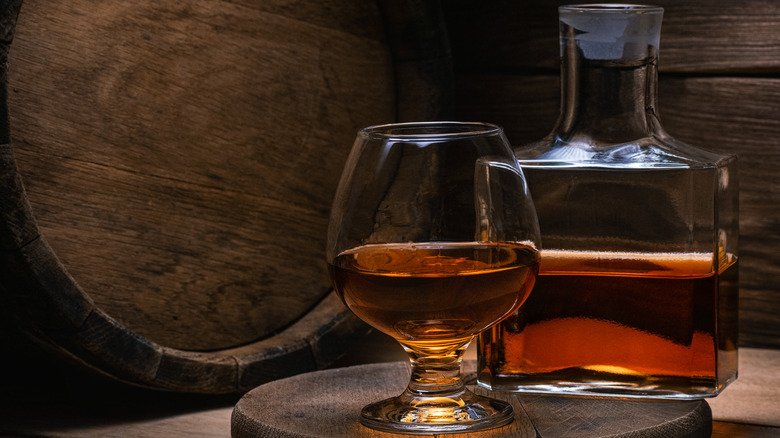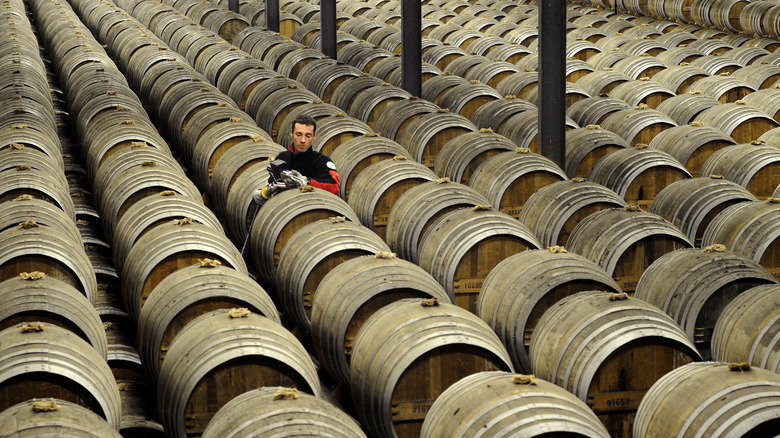What Is Cognac And What Does It Taste Like?
From Victor Hugo's description of it as the "liquor of the gods," as quoted by France 24, to blues legend Buddy Guy's dedication of a song to it (posted on YouTube), cognac comes off as some of the fanciest alcohol you could ever savor. As it should. The Cognac region of France, from which the brandy gets its name, has been cultivating wine since the late third century reign of the Roman Emperor Marcus Aurelius Probus, according to Cognac.com. The Encyclopedia Britannica explains that this was part of his domestic policy to repurpose the army to help establish vineyards in areas like Gaul, modern day France. It also notes that this contributed to the army assassinating him a few years later.
However, cognac only really became cognac as we know it when Dutch traders tried to import the local wine in the 16th century. According to The Crafty Cask, the wine the Dutch bought typically spoiled by the time it reached the Netherlands. The only way they found to produce a wine in Cognac that would survive the trip was to distill it twice, which led to the name brandewijn, meaning burnt wine, and then later brandy. Afterwards, traditions began to accumulate until the brandy made in Cognac received special praise in the same way that sparkling white wine from Champagne has done.
How is cognac made?
First of all, cognac is made by being made in Cognac. Otherwise, it is brandy, regardless of how brilliant it is.
After that bit of pedantry comes the actual production. The base fruit for fermenting, as Liquor.com details, is grapes. The grapes across the Cognac region may vary in quality, but once a local distiller has the harvested grapes, they ferment them for five to seven days. The resulting wine is then double distilled until it is rendered eau-de-vie, a colorless brandy that the cognac makers age in oak barrels for two years. That produces cognac, though distillers typically blend the new cognac with older batches to create the final bottled cognac.
For those interested in what differentiates one cognac from another, Cognac Expert explains the classification system with which cognac is labelled. The basis for the comparisons is the age of the youngest eau-de-vie included in the final cognac blend. So, for example, a cognac comprised of a two-year-old blended with a six-year-old would be considered "Very Special" (VS) Cognac, which is the cheapest variety. The next one up is Very Superior Old Pale (VSOP) with a lower limit of four years, then Extra Old (XO) with 10 years, Extra Extra Old (XXO) with 14 years, and Hors d'Age, or beyond age, that can reach from 30 years to over 100. Other subsections to these categories exist, but they mostly indicate when it has exceeded a minimum without reaching the next level.
What does cognac taste like? How do you drink it?
"It's kind of autumn flavors," David Mason, Beverage and Bar Manager at St. Regis, said to CNN in an attempt to capture the multifaceted taste of a $22,000 — yes, $22,000 — cognac. "Really nutty, almondy — kind of fig, plum, dried fruits. But it finishes off really smoothly but with a little bit of tobacco leaf." The actual flavor of a cognac, Cognac Expert insists, is dependent on the individual cognac you are enjoying, as each is the result of a harmonizing between different cognacs. However, they do grant as a baseline that it tastes reminiscent of other brandies, but with "sweet, spicy, fruity and bitter flavors" unique to the individual cognac.
How to enjoy cognac is a question that is almost as daunting as attempting to throw a single flavor profile over the industry. However, Germain Canto, a bartender at Bar Louise in Cognac, tells Vine Pair that drinking cognac should not daunt so much. You can pair it with cheeses, meats, and mushrooms. You can sip it straight, mix its fruity palate with ginger beer, or throw some ice in it. And, while the fancier cognac mentioned in the beginning of this section drew in a price of $22,000, you can still buy a 750 mL bottle of Hennessy for much, much less. No, it's not cheap, but it's cheaper cognac. The name ensures both its quality and its subsequent price tag.


